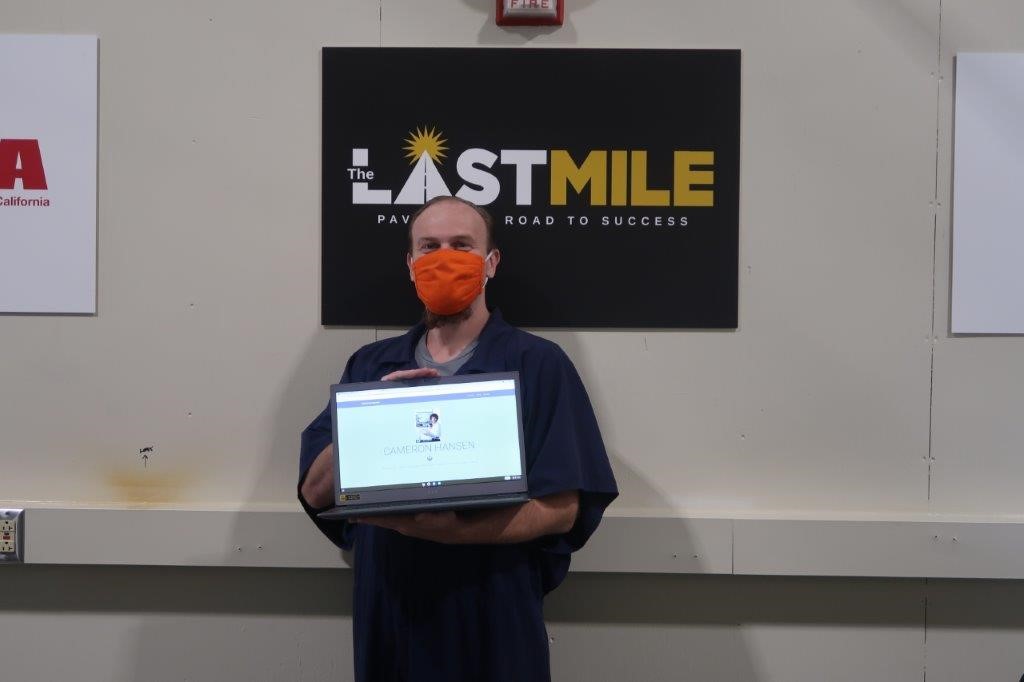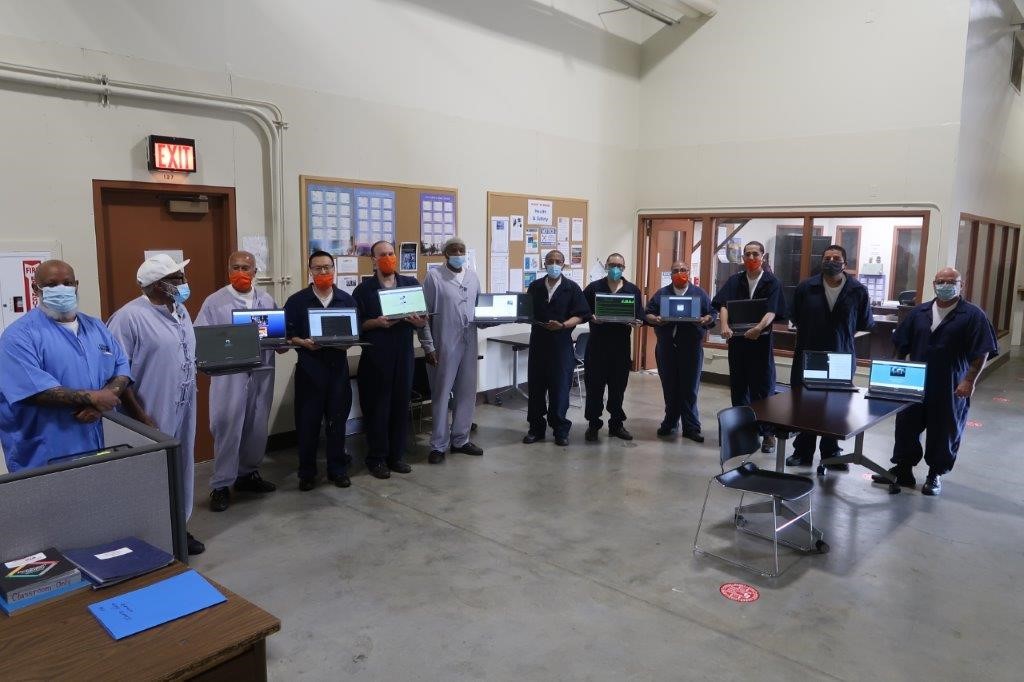Pilot program at Pelican Bay State Prison enables students in TLM’s coding program to take laptops into housing units for continuing education
SAN FRANCISCO – The Last Mile (TLM), in partnership with California Department of Corrections and Rehabilitation (CDCR) and the California Prison Industry Authority (CALPIA) today announced the launch of an innovative pilot that allows students to use laptops in their housing units. The program is the first of its kind in the United States, providing students with a mobile piece of technology that they carry daily between their disconnected housing units and the TLM classroom.
A pilot of the program at Pelican Bay State Prison (PBSP) allows incarcerated students enrolled in the TLM Technology Training Program to take their device from the classroom back to their housing units. The increased access will enable students to increase their coding interactions and studying time. Currently at PBSP, there are 12 participants in the TLM/CALPIA Code.7370 Web Development Program.
“Introducing laptops as educational tools into the prison environment is a monumental step in the direction of bringing modern and equitable educational opportunities to incarcerated people across the U.S.,” said TLM Chief Program Officer, Syd Heller. “TLM is proud to be paving the way and demonstrating a proof of concept of how laptops can provide scalable and responsive programming for millions of people, who currently have little to no access to computers. TLM is actively looking to expand this program across all of our classrooms and partnerships.”
Brant Choate, the Director of CDCR’s Department of Rehabilitative Programs said the pilot is an important first step. “The innovations and pioneering efforts of The Last Mile will help CDCR expand educational opportunities to more CDCR residents. The Last Mile’s Chromebook project will extend learning beyond the classroom into the evenings, weekends and holidays.”
TLM’s Web Development Program is a technology-based career technical education (CTE) program run as a partnership between CALPIA, technology business community professionals and the non-profit organization, Turn2U Inc.. TLM’s Platform as a Service and in-house curriculum includes basic computer skills, computer coding and software engineering instruction, website and web application design, and professional development and soft skills all within the secure TLM ecosystem and without access to the internet. The TLM curriculum teaches HTML, CSS, JavaScript, React, Node, Express, MongoDB, MySQL, Git source control, as well as soft skills and professional readiness. The program consists of 2 courses and takes a year to complete. Incarcerated individuals obtain milestone credits for completion of each course.
The laptops are not able to access the internet. All activities are monitored for safety and security.
PBSP opened in 1989 as a maximum-security institution, but has since transitioned to providing housing for medium- and minimum-security incarcerated people. The TLM Web Development Program is one of several rehabilitative options offered.
“We have worked to transform this facility, inside and out,” said PBSP Warden Jim Robertson. “There are gardens and murals, a new recreation yard and classrooms under construction. Stakeholders like The Last Mile and PIA brought in many new programs. This has now become a place where people, including lifers, can work on their rehabilitation and toward release.”
The Last Mile
The Last Mile, the leading provider of 21st-Century professional skills training programs and transitional support for incarcerated people, is a San Francisco-based 501(c)3 organization whose mission is to provide opportunities for personal and professional growth through education and technology training for justice-involved individuals. Through prison education, transitional support and workforce re-entry, TLM is disrupting the system of mass incarceration across the United States. In-classroom curricula and course material prepares students for meaningful employment in modern job roles including web development, software engineering and audio and video production. Students cultivate personal and professional development in alignment with the technical education and with the support of TLM reentry staff, volunteers, and a community founded on shared lived experiences.
The Last Mile is celebrating its 11th year as an organization, originating with its first program in San Quentin State Prison in California. Over the last decade, The Last Mile has leveraged the power of public-private partnerships with Departments of Corrections and industry leading companies. Programs are currently operating in six states and 16 facilities for men and women across the United States. TLM has been able to expand its purpose, To Imagine, Build, and Open Doors, into other facilities through these partnerships as well as funding and employment opportunities from the technology sector, including Google.org, Slack, GitLab, Stand Together, Verizon, Bank of America and Apple.
Quick Facts About The Last Mile
- Turn 2 U Inc. dbaThe Last Mile a not-for-profit, 501(c)3, tax-exempt organization.
- TLM is based out of San Francisco, California
- Website: https://www.thelastmile.org
- The Last Mile statistics:
- TLM is currently in 6 states and 16 facilities and 24 classrooms
- TLM has served over 800 students
- TLM has served over 350 returned citizens
CALPIA
CALPIA is a self-funded, customer-focused organization that reduces recidivism and enhances prison and public safety by providing approximately 7,000 incarcerated individuals with life-changing training opportunities for successful re-entry into the community.
CALPIA’s program goal supports CDCR’s public safety mission by developing incarcerated individuals who have job skills, good work habits, basic education, and job support in the community, so that, when they are released, they never return to prison. CALPIA incarcerated individuals receive industry-accredited certifications that employers seek.



###
FOR IMMEDIATE RELEASE
Dec. 6, 2021
Contact: OPEC@CDCR.CA.GOV
